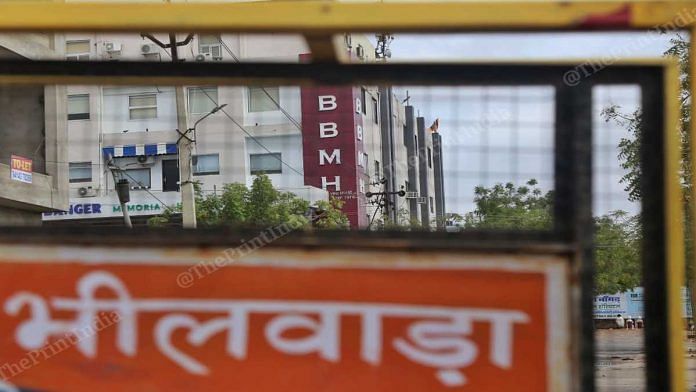New Delhi: Bhilwara, which accounted for the highest number of Covid-19 patients in Rajasthan until a day ago, has seen no positive cases since 30 March even as the state’s total count has risen by 20 in the same period. The last positive case was reported Monday and there’s been none other in over 50 hours since.
However, experts say it is too early to tell if this is the result of the curfew imposed in Bhilwara on 20 March, two days before the nationwide Janata Curfew on 22 March, and four days before the 21-day national lockdown took effect on 25 March.
Bhilwara, 240 km from Jaipur, hit headlines on 19 March, when a doctor at a local private hospital tested positive for Covid-19. By the next day, six doctors and medical staffers at the Brijesh Banger Memorial Hospital in Bhilwara had also tested positive.
The city administration ordered a curfew on 20 March.
Overall, as many as 19 staffers of the hospital had been diagnosed with Covid-19 by 28 March. At one point, Bhilwara accounted for nearly half of Rajasthan’s cases, but its share is down to less than a third. Jaipur now tops the list with 34 cases as of 1 April.
After the spike in the first week, the daily increase in the number of coronavirus cases in Bhilwara has come down, an analysis of data from the Union Ministry of Health and Family Welfare, Rajasthan health department and news reports shows.
Also Read: 6,000 quarantined, 28 lakh people checked — inside Bhilwara, Rajasthan’s Covid-19 ground zero
Does that mean the lockdown works?
Rommel Singh, project director for child health in the state health department, said it was too early to say if the lockdown had had an impact on Covid-19 containment in Bhilwara.
Once multiple staffers at the hospital had been diagnosed with Covid-19, the Bhilwara administration began intensive screening and isolation of high-risk suspects, including hospital staff, their families and patients admitted in the hospital. There were fears in the administration that the 5,580-odd patients treated by the doctor who was first diagnosed with Covid-19 might be vulnerable or may have become carriers.
Nearly 24 lakh people were subsequently screened, 6,000 home-quarantined, and 15,000 patients with flu-like symptoms identified. By 31 March, 1,355 samples were tested for coronavirus and 26 found to be positive.
“We are in the containment phase, we should wait three more cycles to know if the transmission chain is broken,” said Singh, who was given the charge of the Covid-19 containment effort in Bhilwara.
According to Singh, 95 per cent of the hospital-related contacts had been traced but its spread in the community was yet to be ascertained.
Two more door-to-door screening cycles will be conducted, where those with severe symptoms will be identified, quarantined and tested for Covid-19. Also, anyone who has been to the private hospital in the last month or with Covid-19 symptoms can be referred for testing, officials told ThePrint.
“We are expecting two more positive cases of the doctor and his staff who were avoiding screening and whose samples were taken and sent for testing,” Singh said.
Also Read: How 4 states in India with highest patient count are tracking ‘corona clusters’
India’s rising case load
As of 1 April, the seventh day of the nationwide lockdown, there were 1,466 active cases of Covid-19 in India, an increase of 215 cases since the day before. Thirty-eight patients have died so far and 132 cured/discharged.
Meanwhile, the US recorded 26,000 new cases Tuesday and now has a total of 1.9 lakh cases — the highest globally — and 4,000 deaths.
India’s rate of transmission is slower compared to the US, Raman Gangakhedkar, scientist and head of infectious diseases, Indian Council of Medical Research (ICMR), said at a press conference Tuesday.
It’s yet early to gauge the impact of the national lockdown since the incubation period of coronavirus is 14 days, Professor Giridhar R. Babu, head, Lifecourse Epidemiology, Public Health Foundation of India (PHFI), an independent agency, told ThePrint over the phone.
“The lockdown would have helped to reduce the transmission…” he added. “This will reduce the peak of the epidemic curve, which is known as flattening the effect.”
Also Read: Sanitisers to migrant shelters — Rajasthan’s Covid-19 fight is a public-private venture



